Workforce Development at Heart of PCP Scholarship Success
Faculty close to the Primary Care Physician Scholarship Program find the effort inspiring as it helps fill clinical gaps in underserved areas of Arizona.
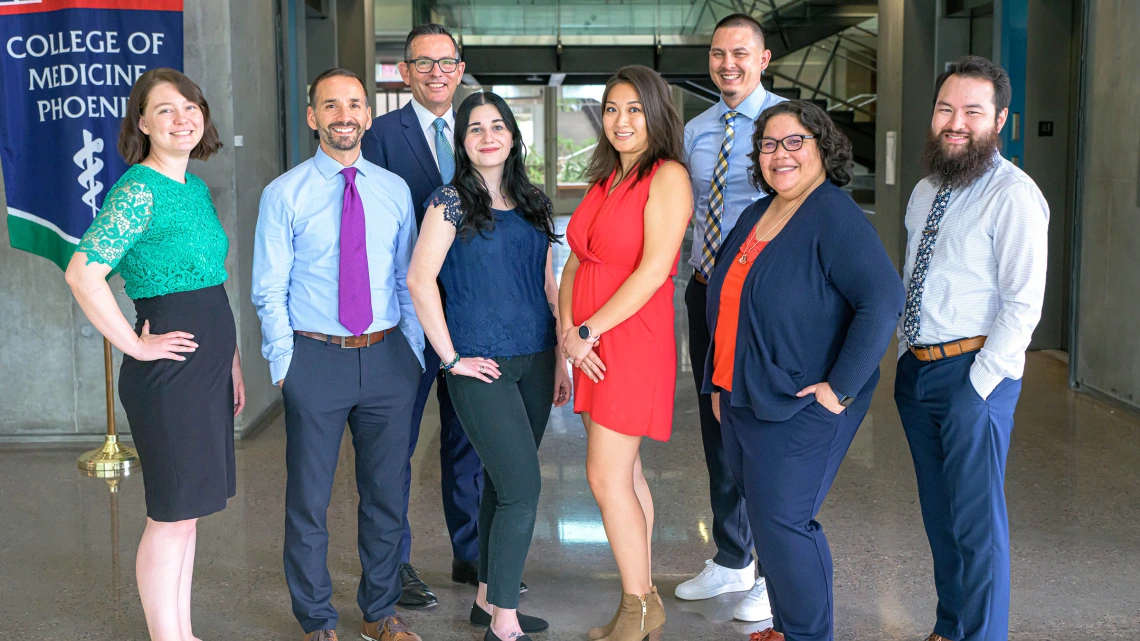
Glen Fogerty, PhD, MBA (third from left), College of Medicine – Phoenix admissions and recruitment associate dean, with his admissions team (L-R): Alex Hughes, Mark Priolo, Dr. Fogerty, Enjoli Pescheta, Julie Chiu, Chip Young, Shari Carbajal and Sam Blair.
The Primary Care Physician (PCP) Scholarship program is part of the core mission of the University of Arizona Health Sciences: aiding aspiring physicians who wish to practice in Arizona’s underserved urban and rural communities.
That’s important due to a dearth of doctors practicing in these areas and tight enrollment limits for medical students, said Glen Fogerty, PhD, MBA, the associate dean for admissions and recruitment at the UArizona College of Medicine – Phoenix.
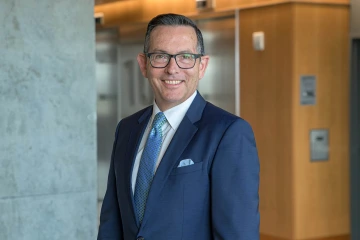
Glen Fogerty, PhD, MBA, associate dean for admissions and recruitment at the UArizona College of Medicine – Phoenix.
Because of the cost of medical school, students tend to select specialties that offer higher salaries or move to more lucrative markets in other states so they can more easily pay down loans, said Dan Derksen, MD, associate vice president for health equity, outreach and interprofessional activities for UArizona Health Sciences. According to the AAMC, the average medical student debt was nearly $195,000 at public universities and $223,000 at private ones in 2022.
“One of the barriers to health professions education is the cost of that education, and that’s really across the board,” Dr. Derksen said. “It’s true also for nursing, dental and mental health. The PCP Scholarship program is an innovative step to help address physician shortages in Arizona.
“The State of Arizona recurring appropriation that subsidizes the PCP Scholarship Program enhances the health professional community-based experiential learning that’s supported by the state and the federally funded and designated UArizona Area Health Education Center (AzAHEC) Program,” Dr. Derksen added. “Of the 56 AHEC programs in the U.S., our program did almost 12% of the nation’s total AHEC program community-based, experiential rotations. Ours are done in collaboration with Arizona’s six AzAHEC Regional Centers and nine Rural Health Professions Programs (RHPPs) in the five UArizona Health Sciences colleges, ASU’s College of Nursing, and NAU’s School of Nursing and their Physician Assistant programs.”
Exposure inspires success
The Primary Care Physician Scholarships are an incentive to keep more physicians in Arizona by easing the financial burden for those who commit to a career in one of seven primary care fields: family medicine, general internal medicine, geriatric medicine, general pediatrics, psychiatry, obstetrics and gynecology, and general surgery.
Through the UArizona Health Sciences program, scholarships are available for students at the College of Medicine – Tucson and the College of Medicine – Phoenix. There are 84 current medical students benefitting from scholarships – 48 in Tucson and 36 in Phoenix. This year’s cohort included 18 students in Tucson and nine in Phoenix. An additional 37 graduates are now doing their residencies, with the first of those graduates scheduled to return to Arizona next summer.
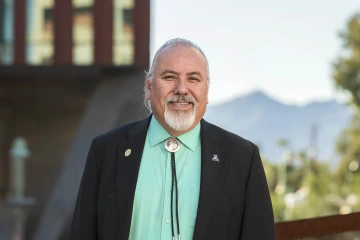
Carlos Gonzales, MD, chaired the UArizona College of Medicine – Tucson’s PCP Scholarship committee before stepping down to join Global MD, a UArizona Health Sciences initiative.
“The reason I think we’re successful is students are exposed to those CUP and rural experiences,” said Dr. Gonzales, adding that nearly all of the College of Medicine – Tucson’s PCP Scholarship recipients participated in free CUP clinics and similar community service experiences, as do 90% of the college’s first- and second-year students.
“That tells me we’re attracting students who want to do that, and we get students that do want to go into primary care. It’s just the mindset of students coming to our schools. That’s what we need – to have more students go into primary care,” he added.
Drs. Gonzales and Fogerty underscored that pipeline programs at both colleges, such as Med-Start and Saturday Scrubs, improve chances by providing opportunities for local middle and high school students from underserved populations to gain exposure to career opportunities in the health sciences.
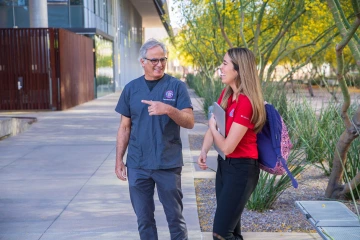
Jonathan Cartsonis, MD, the College of Medicine – Phoenix’s Rural Health Professions Program director, chats on campus with a student who completed the Rural Health Longitudinal Integrated Clerkship in Payson, Arizona, last year.
“For many of our students, what motivated them to go to medical school in the first place is because they wanted to go back and serve. They had memories of having to endure very difficult circumstances of delayed medical care or inadequate medical care for them, their families or friends’ families. They’ve seen that and they want to change it,” Dr. Cartsonis said.
That was part of his motivation, too. He grew up in Litchfield Park, Arizona, then a rural area cut off from west Phoenix by the Agua Fria River. He graduated from the College of Medicine – Tucson and completed his residency in Modesto, California, at a county hospital that served many migrant farmworkers, recent immigrants and refugees. He then worked at a community health center in Maricopa County, where he served mostly uninsured and state-insured patients near his hometown.
“I treated people I went to school with, from kindergarten, grade school and up through high school,” Dr. Cartsonis said. “My patient load was really well-represented by folks from a number of marginalized communities in Arizona. That was really satisfying.”
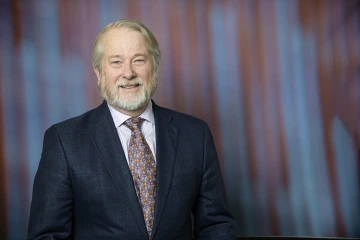
In addition to being the associate vice president for health equity, outreach and interprofessional activities for UArizona Health Sciences, Dan Derksen, MD, is the director of the Center for Rural Health at the Mel and Enid Zuckerman College of Public Health.
HPSA designations identify areas and population groups in the U.S. experiencing shortages of health professionals. According to the Kaiser Family Foundation, Arizona ranks ninth in the nation with 244 primary care HPSA designations that include 3.3 million people. These aren’t just in the state’s 13 more rural counties, but two of the more metropolitan ones, too. According to the Arizona Department of Health Services, 12 of the state’s Medically Underserved Areas lie within Native American tribal land.
“Maricopa and Pima counties, home to Phoenix and Tucson, have significant HPSA designations, so there are a lot of choices for returning physicians on where to practice,” Dr. Derksen said. “The intent of the Primary Care Physician Scholarships is to create incentives and eliminate fiscal barriers so our medical school graduates can practice in high need areas and serve the unmet needs of Arizona’s rural and urban underserved populations. That’s what makes this an incredibly inspiring program.”

